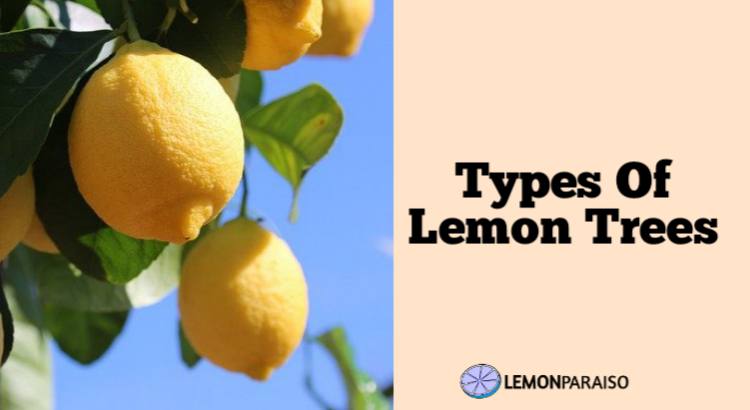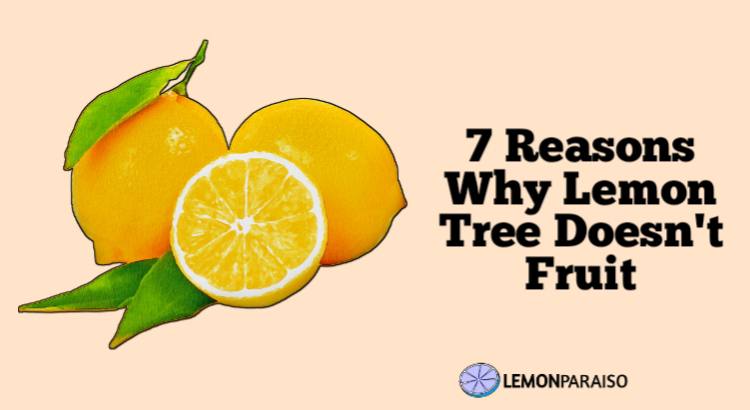Types Of Lemon Trees

What are some of the types of lemon trees? There are many varieties of lemon trees that you can buy at the nurseries or garden centers and bring them home.
If you want to grow lemon trees indoors you can buy smaller lemon tree varieties. But what are the varieties of lemon trees that grow big or grow small?
Types Of Lemon Trees
Here are some types of lemon trees that you can choose if you want to grow a lemon tree at home. There are some important matters to consider if you want to grow a lemon tree and you need to make sure that those trees are suitable to grow at your location.
One of the factors that you need to consider when planting a lemon tree is the climate. Lemon trees are suitable to grow in tropical and subtropical countries. They don’t tolerate too much frost because they are the least cold-hardy.
The lemon trees are growing well in zone 8 to 11. If you are experiencing frost in your location you need to grow your tree indoors or try to look for stronger frost tolerant varieties. You need to know the lemon trees cold tolerance to get some ideas if the tree is suitable to grow in your location.
1. Meyer Lemon Tree
There are many varieties of lemon and Meyer lemon tree is one of the most cold tolerance which is excellent among the other varieties. Most of the citruses like lemon are least cold hardy; they don’t thrive well in a cooler climate and too much cold can damage them.
Mature lemon trees can stand cold but temperatures lower than 29 degrees Fahrenheit (-1.67 degrees Celsius) can affect them. So protection from frost is still needed but if bringing them indoors is the best way to protect them from cold temperatures.
Meyer lemon trees are popular for home gardeners. This tree is a hybrid and crosses between a lemon and a mandarin orange. It is low maintenance, highly disease and insect resistant which is great to grow.
Meyer lemon trees also grows fast and it can produce fruits as early as 2 years. Since it grows fast and produces fruits quickly, you will enjoy getting lemon fruits from Meyer lemon trees quicker than other lemon varieties.
Those fruits will appear on the tree sooner. Usually, lemons taste sour but the fruits of Meyer lemon tree are a little bit sweeter than other varieties. Making lemonade with its fruits will taste awesome.
2. Lisbon Lemon Tree
Lisbon lemon is one of the most common lemons that can be found at any grocery store. The fruit of this lemon tree is a little bit bigger compared to other varieties. Also, it produces large-sized lemon fruits that has a high amount of juice. The size of the fruit dictates the amount of juice it has.
You can get zest from this fruit but you need to wash them thoroughly to remove lemon tree fertilizer on the skin. Most lemons sold at the market use chemical fertilizers.
Chemicals are not safe for us and by washing them well you can feel safer by doing that. You can also try finding organic lemons if you want to zest them.
3. Avalon Lemon Tree
When it’s time to plant a lemon tree, you can try growing an Avalon lemon tree at home. This tree is not commonly sold at the market and if you wish to have fruits coming from this tree then try to grow an Avalon lemon.
The fruits from this lemon tree are big, yellow in color, and taste a mild sweet-tart flavor. Most lemon trees are growing in tropical and subtropical countries and Avalon lemon grows well in semi-tropical places.
If you love making lemon ginger water, you can use Avalon lemon fruits to make one. Since the fruits are big you can get a lot of juice coming from one fruit.
Lemons and ginger have a lot of vitamins and minerals which are good for health. You can make more drinks when you have a lot of lemon fruit.
4. Variegated Pink Lemon Tree
Variegated pink lemon tree is a cool type of lemon tree. It has different color compared to other lemons. Usually, lemons have yellow flesh, but this one has pink. The skin of this fruit is yellow striped with deep green.
When it comes to the taste, it is sweet and milder than other varieties. You will surely enjoy the amount of lemon juice from this fruit.
Some gardeners like this lemon tree because it’s low-maintenance and a little bit hardy. The fruits will appear on the trees sooner once the tree starts growing.
5. Eureka Lemon Tree
Eureka lemon tree is one of the most popular varieties of lemon with commercial interest. The fruit from this tree is also one of the common lemons that you can see at the grocery store. The fruits are rich in oil content, firm, and have a great taste.
If you are planning to grow Eureka lemon you need to make sure that it will get more sun. The sunlight requirement for a lemon tree is at least 4 hours for young trees and at least 6 hours for mature trees.
The sunlight helps the lemon tree create its food so bringing potted lemon tree outside will help to make them grow better.
Also, this tree doesn’t thrive well in cold temperatures and much cold will damage it. It has thornless branches so it will be easier to harvest fruits from the tree.
6. Ponderosa Lemon Tree
The lemon tree height varies in its types. Some trees grow tall and some grow short. When it comes to Ponderosa lemon tree, it grows between 12 to 24+ feet (3.7-7.3+ m) tall. It can be grown in pots and they can stay small by pruning.
Ponderosa is not a true lemon tree. It is developed by crossing a lemon and a citron. It produces big fruits that can weigh around 5 pounds (2.27 kg). Because of the fruit size, you can have more lemon juices from a single fruit.
Growing this tree is a little difficult for places with cooler climates. They grow well in locations with hot climates. Sunlight helps them thrive and grow fast.
7. Verna Lemon Tree
Placing potted lemon trees indoors is usual especially when the weather becomes too cold. Verna lemon tree grows well in hot climates but it can also survive a little bit in cooler climates.
But still, they need protection when the weather becomes too cold especially if they are planted outdoors. This tree produces medium-large, bright yellow, and juicy fruits.
The Verna lemon fruits also contain fewer seeds. When you slice the fruit, you will get more juice because there are only a few seeds in the fruit and also the size of the fruit is bigger than other varieties.
8. Primofiori Lemon Tree
When a lemon has a thin rind it means that you can get more juices from it. Just like Primofiori lemon which has a thin rind. The rind is easy to peel and the flesh is juicy but highly acidic. Getting fruits from this tree (also called Fino) is great because you can use them in many ways.
Making lemonade is possible to do with the use of their fruits. You can even use them in making cakes, cookies, and other desserts. Aside from desserts, you can also use them as a sauce for the fish. Dipping the fried or grilled fish into the lemon sauce is perfect.
9. Bearss Lemon Tree
Bearss lemon tree produces bright yellow lemon fruits. Not surprising but their taste also is juicy and sour just like other varieties. If you want thornless tree branches then try growing Bearss lemon tree. It will be easy to harvest lemon when your tree has fewer spikes.
The Bearss lemon tree grows well in semi-tropical climates. Too much cold can damage them and they should be placed indoors especially when they are planted in the pot. While covering with blankets, canvas, or tarps is best to do for trees planted in the ground outdoors.
10. Dorshapo Lemon Tree
Some people don’t like too sour fruits. Dorshapo lemon is a little bit low in acid and has a quite sweet flavor. Most of the lemons taste sour and this one has a little bit different taste. The juice of it is awesome to use in making your lemon drinks or you can eat it with salt.
Dorshapo lemon tree will not thrive well in cooler climates and they are best to grow indoors. And when the spring and summer come again you can place them outside to get sunlight.
11. Genoa Lemon Tree
The Genoa lemon tree was developed in Italy. This tree is a bit cold-hardy and can be grown in a cooler climate. Climates are different in many countries and if you have semi-tropical climates you can grow this tree in your location.
Getting fruits from this tree will be a bit faster because it grows fast and the fruits ripen quickly. You can get an early harvest than other varieties. A fresh lemonade will be made sooner.
12. Baboon Lemon Tree
The baboon lemon tree is native to Brazil. This tree loves warm climates. Growing them in sunny places will help them grow fast. It is more heat resistant than other lemon varieties. You need to plant them a little bit far from other trees because those big trees will block the sun away from your lemon trees.
When it’s starting to flower, those flowers will eventually transform into lemon fruits. The fruits taste sour but it has a lot of juice. It has a thick peel but is a bit bigger than other lemons. It will give you lots of juice that you can use in making drinks.
Conclusion:
It is great to know some types of lemon trees that are going to produce excellent fruits that you will surely enjoy consuming. Sometimes if you want to grow a tree like a lemon tree, you choose the best one.
A tree that will produce fruits that have a great taste. You can use the fruit to make lemonade or use and mix them with other dishes. You will get more fruits more often when you grow a tree instead of buying lemons at the market.


